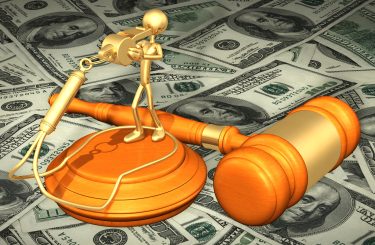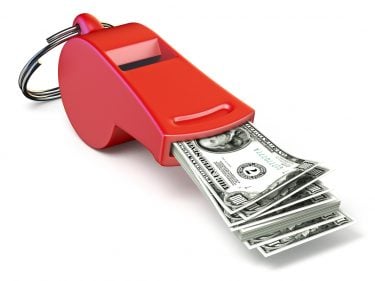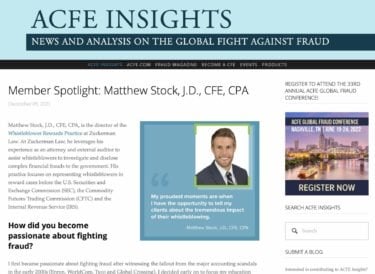SEC Whistleblower Cases Resulting in Successful Award Claims
 Since 2011, SEC whistleblower cases have resulted in more than $2 billion in awards to whistleblowers, which includes awards to our clients totaling millions of dollars. The largest SEC whistleblower awards to date are $279 million, $114 million, and $110 million.
Since 2011, SEC whistleblower cases have resulted in more than $2 billion in awards to whistleblowers, which includes awards to our clients totaling millions of dollars. The largest SEC whistleblower awards to date are $279 million, $114 million, and $110 million.
Under the SEC Whistleblower Program, whistleblowers are eligible for an award when they voluntarily provide the SEC with original information that leads to a successful enforcement action with monetary sanctions in excess of $1 million. Once there is a final judgment or order in the SEC’s action, whistleblowers must submit a claim for an award to receive between 10% and 30% of the monetary sanctions collected.
To date, successful whistleblower cases have enabled the SEC to bring enforcement actions against wrongdoers resulting in orders for more than $6.5 billion in monetary sanctions.
If you are seeking representation from experienced SEC whistleblower attorneys to qualify for an SEC whistleblower award, click here to schedule a free, confidential consultation. The Director of Zuckerman Law’s Whistleblower Rewards Practice, Matthew Stock, can be reached directly at (202) 930-5901 or [email protected].






See our tips for SEC whistleblowers that have enabled our clients to receive substantial awards.
Recently the Association of Certified Fraud Examiners published a profile of Matt Stock’s success working with whistleblowers to fight fraud:
SEC Whistleblower Cases
 Since the inception of the SEC Whistleblower Program in 2011, the SEC has received more than 100,000 whistleblower tips and awarded more than $2 billion to whistleblowers. The SEC Office of the Whistleblower’s most recent annual reports highlight how the program is now firing on all cylinders and awarding whistleblowers who provide original information that leads to successful enforcement actions with monetary sanctions in excess of $1 million.
Since the inception of the SEC Whistleblower Program in 2011, the SEC has received more than 100,000 whistleblower tips and awarded more than $2 billion to whistleblowers. The SEC Office of the Whistleblower’s most recent annual reports highlight how the program is now firing on all cylinders and awarding whistleblowers who provide original information that leads to successful enforcement actions with monetary sanctions in excess of $1 million.
In Fiscal Year (FY) 2021, the SEC awarded $564 million to whistleblowers. In FY 2022, the SEC issued $229 million in awards to whistleblowers. In FY 2023, the SEC awarded nearly $600 million to whistleblowers, and in FY 2024, the SEC awarded more than $255 million whistleblowers.
Are SEC complaints available to the public?
The details of most cases resulting in awards are not publicly available due to key facets of the SEC Whistleblower Program.
- The rules of the SEC Whistleblower Program allow whistleblowers to report anonymously to the SEC if represented by an attorney. In fact, in certain circumstances, a whistleblower may remain anonymous, even to the SEC, until an award determination.
- Even at the time of an award, a whistleblower’s identity is not made available to the public as the SEC protects the confidentiality of whistleblowers and does not disclose information that might directly or indirectly reveal a whistleblower’s identity. For example, the SEC does not disclose the specific SEC whistleblower case that resulted in an award because that information could directly or indirectly reveal a whistleblower’s identity. See Section 21F(h)(2) of the Exchange Act. A brief review of the SEC’s final orders announcing awards highlights how the SEC excludes or redacts any information that could reveal a whistleblower’s identity.
- Most whistleblowers choose not to go public about their award…but not all.
Successful SEC Whistleblower Cases
The SEC whistleblower cases identified below represent some of the successful claims for an award where either the whistleblower’s identity was revealed or the enforcement action that led to the whistleblower award was revealed.
Whistleblower Exposing FCPA Violations Results in $28 Million Award
 When the SEC brings a successful enforcement action in excess of $1 million, whistleblowers may also be eligible for related action awards. This occurs when a whistleblower provides information to the SEC and another agency that leads to two successful enforcement actions stemming from the whistleblower’s tip.
When the SEC brings a successful enforcement action in excess of $1 million, whistleblowers may also be eligible for related action awards. This occurs when a whistleblower provides information to the SEC and another agency that leads to two successful enforcement actions stemming from the whistleblower’s tip.
On April 30, 2018, Panasonic agreed to pay $280 million ($143 million to the SEC and $137 million to the DOJ) to resolve charges of the Foreign Corrupt Practices Act (FCPA) and accounting fraud violations involving its global avionics business. According to the SEC’s press release announcing the action: “Panasonic’s U.S. subsidiary, Panasonic Avionics Corp. (PAC), a provider of in-flight entertainment and communication systems, offered a lucrative consulting position to a government official at a state-owned airline to induce the official to help PAC in obtaining and retaining business from the airline. At the time it orchestrated the bribery scheme, PAC was negotiating two agreements with the airline valued at more than $700 million. PAC ultimately retained the official and paid approximately $875,000 for a position that required little to no work, using an unrelated third-party vendor to conceal the payments.”
On May 19, 2021, the SEC issued a $28 million award to a whistleblower for providing information and assistance that led to SEC and DOJ enforcement actions against Panasonic. The whistleblower received 10% of the total monetary sanctions collected in both enforcement actions.
SEC Whistleblower Case Targeting Financial Reporting Fraud Results in Three Successful Award Claims, Totaling $88 Million
On March 19, 2018, the SEC announced its then largest-ever whistleblower awards, with two whistleblowers sharing a nearly $50 million award and a third whistleblower receiving more than $33 million. The three whistleblowers were later revealed to be employees of Merrill Lynch who exposed that the brokerage was misusing customer cash by holding up to $58 billion a day in a clearing account when it should have been held in reserve. The SEC fined Merrill Lynch $415 million for the violations. See the SEC’s order determining the whistleblowers’ award claims here.
SEC Whistleblower Case Combatting EB-5 Fraud Results in Successful $14.7 Million Award Claim
In late-2012, a whistleblower, Michael Sears, anonymously filed a tip with the SEC about EB-5 fraud in a $147 million project run by Anshoo Sethi. As a result of Sears’ tip, the SEC obtained an emergency court order on February 8, 2012 to freeze the assets of Sethi and his companies in order to protect the investor funds. As detailed in the SEC’s complaint, Sethi raised millions from investors by making material misrepresentations about the EB-5 project. Then, after raising the funds, Sethi diverted more than $2.5 million to his own personal bank account in Hong Kong.
On April 19, 2013, the court ordered the return of the $147 million to the investors and Sears became eligible to apply for an award. On October 1, 2013, the SEC announced the more than $14 million SEC whistleblower award, however, in accordance with the SEC’s rules, the press release did not disclose Sears or the SEC whistleblower case in connection with the award. Sears’ identity was only revealed after his business partner, John Tung, filed a lawsuit against him claiming Sears owed him part of the multi-million dollar award.
SEC Whistleblower Case Against Monsanto Results in Successful $22M Award Claim for a Former Executive
On February 9, 2016, the SEC announced that Monsanto agreed to pay an $80 million penalty for inadequate internal accounting controls. According to the SEC’s order, the company failed to properly account for millions of dollars in rebates offered to retailers and distributors of Roundup after generic competition had undercut its prices and caused the company to lose a significant share in the market. Monsanto booked significant revenue from sales incentivized by the rebate program, but failed to recognize all the related program costs at the same time.
On August 30, 2016, the SEC announced an award of $22 million to a whistleblower “whose detailed tip and extensive assistance helped the agency halt a well-hidden fraud at the company where the whistleblower worked.” In September 2016, the whistleblower surfaced in the media, however, chose to remain anonymous (only disclosing that he was a former Monsanto executive) because he was unsure about his future career path and did not want his involvement in the SEC whistleblower case to damage it. Like Ben-Artzi, the former executive was frustrated that the SEC did not take action against others at Monsanto who knew about the fraud.
SEC Whistleblower Case Exposing Financial Reporting Fraud Results in $16.5 Million Award for a Former Risk Officer
Eric Ben-Artzi, a former risk officer at Deutsche Bank, blew the whistle on the bank for fraudulently inflating the value of the bank’s portfolio of credit derivatives during the height of the financial crisis. The SEC acted on Ben-Artzi’s tip about financial reporting fraud and ultimately fined the bank $55 million. Due to the success of Ben Artzi’s tip (along with a co-whistleblower), the SEC determined that each whistleblower was entitled to a whistleblower award of $8.25 million, totaling $16.5 million.
In a column in the Financial Times, We must protect shareholders from executive wrongdoing, Ben-Artzi announced that he was turning down his share of the award, or at least until certain conditions were met, to ensure that bank executives were held accountable. Ben-Artrzi stated: “Deutsche did not commit this wrongdoing. Deutsche was the victim . . . Meanwhile, top executives retired with multimillion-dollar bonuses based on the misrepresentation of the bank’s balance sheet. It is therefore especially disappointing that in 2015, after a lengthy investigation helped by multiple whistleblowers, the SEC imposed a fine on Deutsche’s shareholders instead of the managers responsible.”
Ben-Artzi requested that his “share of the award be given to Deutsche and its stakeholders, and the award money clawed back from the bonuses paid to the Deutsche executives, especially the former top SEC attorneys.” Once those conditions were met, Ben-Artzi said he would be willing to collect a whistleblower award. Ultimately, Ben-Artzi accepted the award.
SEC Whistleblower Program
To learn more about the SEC Whistleblower Program, see Zuckerman Law’s eBook SEC Whistleblower Program: Tips from SEC Whistleblower Attorneys to Maximize an SEC Whistleblower Award.
What is the Process to Qualify for an SEC Whistleblower Award?
Zuckerman Law guides SEC whistleblowers through a multi-step process: assessing the eligibility of information, if is credible and timely, preparing a solid analysis to SEC presentation, assisting SEC investigations, and maximizing the potential award. Importantly, anonymity is guaranteed. Once the SEC is notified of the award determination, an evaluation is made as to whether to accept or appeal the determination.
Leading SEC Whistleblower Law Firm
Zuckerman Law represents whistleblowers worldwide before the SEC under the Dodd-Frank SEC Whistleblower Program. The firm has a licensed Certified Public Accountant and Certified Fraud Examiner on staff to enhance its ability to investigate and disclose complex financial fraud to the SEC, and two of the firm’s attorneys served in high-level positions at a government agency that protects whistleblowers.
Firm Principal Jason Zuckerman has been named by Washingtonian Magazine as a “Top Whistleblower Lawyer” and the firm has been ranked by U.S. News as a Tier 1 Firm in Labor & Employment Litigation.
As discussed in our articles, the SEC Whistleblower Reward Program has become a very effective enforcement tool for the SEC. But very few whistleblowers have received awards, which underscores the importance of having experienced counsel represent a whistleblower effectively at the SEC.
- MarketWatch: More than 33,000 tips, $2.5 billion in financial remedies and $500 million in awards to investors — the SEC’s whistleblower program turns 10 years old today
- Going Concern: Here Are 6 Reasons Why the SEC Whistleblower Program Is Successful
- National Law Review: 5 Ways that Experienced SEC Whistleblower Law Firms Can Effectively Advocate for Whistleblowers
- D&O Diary: How the SEC Whistleblower Program Has Changed Corporate Compliance and SEC Enforcement
- Forbes: One Billion Reasons Why The SEC Whistleblower-Reward Program Is Effective
Whistleblower law firm Zuckerman Law has substantial experience investigating securities fraud schemes and preparing effective submissions to the SEC concerning a wide range of federal securities violations, including:
- Accounting fraud;
- Investment and securities fraud;
- Insider trading;
- Foreign bribery and other FCPA violations;
- EB-5 investment fraud;
- Manipulation of a security’s price or volume;
- Fraudulent securities offerings and Ponzi schemes;
- Hedge fund fraud;
- Unregistered securities offerings;
- Investment adviser fraud;
- Broker-dealer anti-money laundering program violations;
- False or misleading statements about a company or investment;
- Inadequate internal controls;
- Deceptive non-GAAP financials;
- Improper revenue recognition;
- Violations of auditor independence rules;
- Misleading or incomplete cybersecurity disclosures; and
- Blockchain fraud.
To schedule a free preliminary consultation with Zuckerman Law attorneys, click here or call us at 202-262-8959. Click below to hear lawyer Matt Stock’s tips for SEC whistleblowers:




